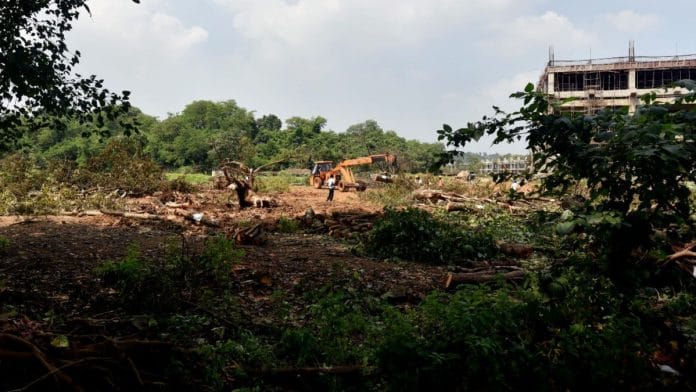Mumbai: Following the Supreme Court’s rap about poor compensatory plantation for infrastructure projects, the Maharashtra government has come up with a fresh policy to ensure that projects that require axing of trees effectively make up for the green cover lost.
The policy makes urban local bodies responsible for keeping ready land banks with suitable soil and climatic conditions, plant local species of a certain height with organic fertilisers, and upload on their websites reports on the condition of the trees every six months.
The policy also seeks to bring more transparency in the process by asking authorities to mark the GPS location of the land and geo-tag the trees for anyone who wants to track their wellbeing and raise complaints if any. The state government issued a government resolution on Monday elaborating the policy.
The resolution and the new policy come after the Supreme Court in October deferred permission for the felling of the remaining 1,039 trees for the Goregaon-Mulund Link Road project being implemented by the Brihanmumbai Municipal Corporation. In July, the Supreme Court had given permission to fell 95 trees for the project.
While deferring the decision, the court cited how the compensatory afforestation carried out by the Mumbai Metro Rail Corporation, which built the underground Aqua line and a metro car shed at the ecologically sensitive Aarey Colony, was not up to the mark.
The Supreme Court had then asked the Maharashtra government to formulate a policy for effective management and protection of trees planted as part of compensatory afforestation.
On Monday, the day the state government published its new policy, the apex court allowed the BMC’s Tree Authority to consider the civic body’s proposal for the additional felling of trees.
The 12.2-km Goregaon Mulund Link Road project aims to boost the city’s east-west connectivity by linking the Western Express Highway to the Eastern Express Highway. The Rs 14,000-crore high-speed corridor has been planned as a combination of bridges, tunnels and traffic interchanges. The twin tunnels will be more than six kilometres in length and will go under the ecologically sensitive Sanjay Gandhi National Park to exit at Mulund.
The new compensatory afforestation policy
The government resolution states that the urban local bodies will be responsible for ensuring the wellbeing of trees planted under compensatory afforestation. It said the ULBs should maintain a land bank “exclusively preserved” for compensatory afforestation.
For projects within the land-starved Mumbai city, the project implementation authority will have to identify a suitable land parcel within the larger Mumbai Metropolitan Region and get the prior permission of the landowner for the plot to be used for compensatory plantation.
If a plot on which government bodies have carried out compensatory afforestation is more than one hectare and is near a forest area, the authorities should designate it as a ‘no development zone’.
The policy also states that the authorities should look for native species that suit the climate and environment conditions of the place, and at the time of plantation the sapling should be at least 12 feet. Moreover, it should live healthily for at least seven years. If any tree dies within that seven year period, the authority responsible will have to plant an equal number of trees afresh in their place.
The information about the land, its location, the geo-tagged plantations will be put up on the relevant civic body’s website, and their well being report should be updated every six months. Any person should be able to access this information easily and lodge complaints in case there are any encroachments, illegal felling of these trees or signs of diseases.
Authorities will have to put up an action taken report on these complaints within 30 days. The policy also calls for tree guards, and a boundary wall of eight feet around the plantation, as well as the placement of security persons to protect the land.
‘Only 50% of plantation at Aarey survived’
In October, a report placed before the Supreme Court showed just 10,230 out of the total 20,460 saplings planted as compensation for the felling of trees in the ecologically sensitive Aarey Colony for the Metro car shed survived.
“It is also noticed that in certain patches the survival is moderate and in want of continuous maintenance and care,” the Supreme Court had said in its order dated 27 October. It added that factors such as poor soil depth, water scarcity and external disturbances adversely affected the growth and survival of the saplings.
There was no proper chain link fencing around the plantation area and the height of the surviving saplings varied from one foot to 20 feet. The apex court said it doesn’t appreciate the plantation of one-foot tall saplings as compensation for felling big trees, and that the forestry sector has advanced and several tall saplings are available for afforestation.
“If the Court has granted permission for felling of trees taking into consideration the larger public interest, the compensatory afforestation ought to have been done with utmost sincerity. We find that the State or its authorities have not attended to the same with the sincerity required,” the court had said.
The proposal to hack trees at Aarey Colony, one of the city’s last remaining green lungs, had met with stringent opposition with a large group of citizens and activists vehemently protesting against it. It had even become a political controversy with the ruling Bharatiya Janata Party (BJP) in favour of building the car shed at Aarey and its then ally, the undivided Shiv Sena under Uddhav Thackeray, staunchly opposing it.
(Edited by Ajeet Tiwari)






